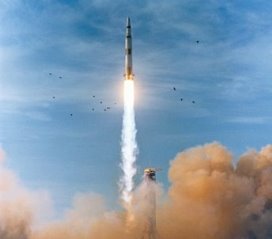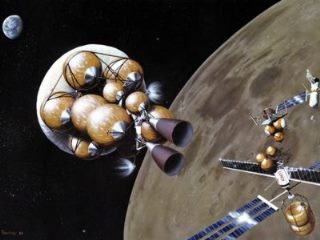
I want to walk on the Moon.
I want to look out into the blackness of space.
I want to see Earth in its place in the cosmos.
I want to feel it, and know my place better.
- Chris Churchill
|

Above:
What might you do with this course?
Build a system like this
for mining propellant from the Moon,
to make Mars transportation easier.
|
PHYS 175T Orbital Mechanics and Spaceflight
TuTh 6:30-7:45 p.m. in McLane 229.
2023 Fall Course Syllabus:
Please read carefully
|
Instructor: Professor
Ringwald
Email: ringwald[at]csufresno.edu and replace [at] with @
Phone: (559) 278-8426
Office: Room 11 in the J wing (Building J) of McLane Hall.
Office hours: TuTh 7:45-9:20 p.m. and We 6:00-7:15 p.m.
and other times too, by appointment.
|
Course description: (3 credits) Prerequisites: PHYS 4A and any
one of CSCI 40, ECE 71, PHYS 106 (Intro. Computer Simulations in
Physics) (formerly PHYS 175T), PHYS 175T (Intro. to Programming and
Modeling Complex Systems for Scientists), or equivalent programming
experience. An introduction to spaceflight, for scientists and
engineers. The space environment. Rocket performance. Coordinate and
timekeeping systems. The gravitational two-body problem: particle
dynamics and motion under inverse square forces. Analytical, numerical,
and computer solutions for spacecraft orbit determination, trajectories,
time of flight, and maneuvers. Orbits for Earth satellites. The
three-body problem: lunar and interplanetary trajectories.
Lecture meeting times and location: Schedule 77461 (Section 01),
TuTh 6:00-7:15 p.m. in McLane 229.
Required Course Texts, which should be available at Kennel
Bookstore or Amazon.com:
(1) Fundamentals of Astrodynamics, Second Edition by Roger R.
Bate, Donald D. Mueller, Jerry E. White, and William W. Saylor - also
known as BMW2 (ISBN-13: 978-0486497044).
(2) Spacecraft Dynamics 3rd ed. (2010), by William E. Wiesel
(ISBN-13: 978-1452879598).
(3) Satellite Basics for Everyone (2012), by C. Robert Welti
(ISBN-13: 978-1475925937).
Course webpage:
http://zimmer.csufresno.edu/~fringwal/phys175torb.html
Class Objectives (also known as Learning Outcomes):
(1) To introduce physicists, other scientists, and engineers to the field
of spaceflight, to prepare them for careers in aerospace.
(2) To examine the physics of gravitation and orbital theory as applied
to spaceflight.
(3) To give physics, other science, and engineering majors practical
experience in C++, Python, or MATLAB programming for science and
engineering applications.
TENTATIVE list of topics to be covered (updated 2023 September
15):
| Week
| Topic
| BMW2 chapters
| Wiesel chapters
|
| 1
|
Phys 4A review, the Space Environment, and Rocket Propulsion
| -
| 9, 7; also Welti (whole book)
|
| 2
| Gravitation and the Two-Body Problem
| 1
| 1, 2
|
| 3
| Position and Time
| 1
| -
|
| 4-5
| Orbit Determination
| 2
| -
|
| 5
| First mid-term exam: Thursday, October 5
| 1
| 1-2, 7, 9, Welti (whole book)
|
| 6
| Orbit Determination (continued)
| 2
| -
|
| 8
| Basic Orbtial Maneuvers, Earth Satellites
| 3
| 3; also review Welti (whole book)
|
| 9
| Position and Velocity
| 4
| -
|
| 10
| The Gauss Problem
| 4,5
| -
|
| 11
| Second mid-term exam: Thursday, November 2
| 3-5
| -
|
| 11
| The 3-body problem, Lunar Trajectories
| 7
| 10
|
| 12-13
| Lunar and Interplanetary Trajectories
| 7,8
| 11
|
| 15-17
| Perturbation Theory
| 9
| -
|
Course grades will be awarded for the following final
percentages:
85.0-100% = A; 70.0-84.9% = B; 55.0-69.9% = C; 40.0-54.9% = D; 0-39.9%
= F.
These percentages will be computed with the following weights:
|
Homework (Sorry, but no late assignments will be accepted.)
|
35%
Mid-term Exams, which will take the entire 75-minute
class periods on Thursday, October 5
and Thursday, November 2
30% (15% each)
Final Exam, which will be comprehensive,
at 8:00-10:00 p.m. on Thursday, December 14,
in McLane 229 (the regular classroom)
|
35%
| | | | |
Sorry, but Professor Ringwald doesn't give makeup exams. Any student who
misses either of the mid-term exams for a valid reason (a job interview
or illness documented by a physician's note) will have the exam grade
voided and the remainder of the grade counted as 100%. Any student who
misses the final exam will get a grade of I (Incomplete) for the course.
Please note:
Please read the chapters before class. Class time is
valuable: it is much better spent in informed, active discussion among all
of us than in just me talking. Asking questions is also part of active
discussion. Please don't be shy about asking questions in class, or
during office hours.
I expect to use email extensively to communicate with you, and
please feel free to send email to me. However, all assignments,
including homeworks, paper titles and summaries, and papers, must be
handed in as hardcopies during the first five minutes of the
class periods in which they are due.
Sorry, but no late assignments will be accepted.
Students are expected to keep all copies of all work they have done
in this class for the duration of the class. It would be a good idea to
hang onto all copies of all work they have done in all classes ever, for
life.
Professor Ringwald will allow students to collaborate with each
other on homework and projects, provided everyone lists their
"co-investigators." Scientists often do this, and the ability to
collaborate well and work as part of a team is a good skill to have, in
many professions. Collaboration, however, must be genuine
collaboration, not one person doing all the work, and the others
blindly copying. That's cheating! Therefore, while you may work on
homework together, write up the results separately, in your own
words. A dead giveaway is when two homework assignments are exactly
the same: this is very noticeable.
Cheating and plagiarism:
Professor Ringwald will not allow students to take work of any kind,
from the internet or elsewhere, and turn it in as their own work. This
is now easy for professors to detect, with www.plagiarism.org. If Professor
Ringwald finds anything on webpage anywhere that closely resembles any
student's work, that webpage had better have the student's name on it.
If it doesn't, the student's turning in that work with the student's
name on it will be interpreted as an attempt to misrepresent someone
else's work as the student's own, which constitutes plagiarism.
Remember, always: you are responsible for anything with your name on
it.
If Professor Ringwald finds any plagiarized work, the student will
receive an F for the entire course. Professor Ringwald may also send
the plagiarized work to the Dean and recommend the student be expelled
from the University. Do NOT plagiarize! Modifying someone
else's work slightly, or changing the text around, or stringing someone
else's paragraphs together, even if they're cited, is no better: none of
these dubious practices make it your work. For information on the
University's policy regarding cheating and plagiarism, refer to the
Schedule of Courses (Legal Notices on Cheating and Plagiarism) or
the University Catalog (Policies and Regulations).
Students with Disabilities: Upon identifying themselves to the
instructor and the university, students with disabilities will receive
reasonable accommodation for learning and evaluation. For more
information, contact Services to Students with Disabilities in the Henry
Madden Library, Room 1202 (278-2811).
University Policies -- The following University policies can
be found at:
University Services -- The following University services can
be found at:
Of interest:
Astrodynamic Constants
and Parameters, by the Solar System
Dynamics Group of the Jet
Propulsion Laboratory.
The Basics of Spaceflight
Learners' Workbook, by Dave Doody and George Stephan at JPL.
Planetary
Fact Sheets, by the National
Space Science Data Center (NSSDC).
Three sources of space news:
Other astronomy courses at Fresno State include:
This syllabus and schedule are subject to change in the event of
extenuating circumstances. If you are absent from class, it is your
responsibility to check on announcements made while you were absent.
Last updated 2023 September 15. Webpage by
Professor Ringwald
Department of Physics,
California State University, Fresno. Please read this disclaimer.

